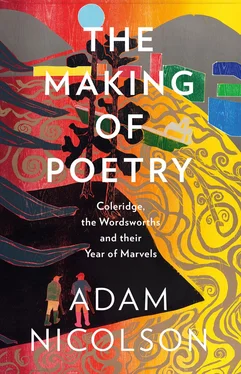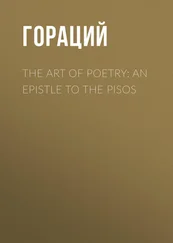Coleridge’s chaos alienated Lovell and the other Frickers, who advised against the marriage and swirled superior offers in front of Sarah’s eyes. Two rich young men proposed when Coleridge was away, but she would have neither. When Coleridge returned to Bristol early in 1795, something had changed, and he could begin to be amazed by this beautiful, competent, strong-minded woman, who was quite clearly and courageously in love with him, despite what all around her were saying to the contrary. By the summer of that year he had fallen in love with her in return.
For £5 a year, before their marriage, they rented a cottage in Clevedon, on the shores of the Bristol Channel, where the tallest of the roses in the garden looked in at the window of the first-floor bedroom, and there, away from the world, in August 1795, in anticipation of their happiness, Coleridge had written his first great poem.
As much as Wordsworth’s twin entrancements with Annette Vallon and Michel Beaupuy, and his lines on the baker’s cart, this poem, called ‘Effusion 35’ in 1795, later ‘The Eolian Harp’, stands at the headwaters of the Quantocks year. Coleridge and Sara – no ‘h’ was an attempt to classicise her – are together on a warm and quiet August evening, within earshot of the sea. They sit beside their cottage, ‘o’ergrown/With white-flower’d Jasmin, and the broad-leav’d Myrtle’, and while Venus appears in the evening sky they watch the light fading from the clouds. Quietness envelops them, and the revolutionary world is a universe away.
How exquisite the scents
Snatch’d from yon bean-field! and the world so hush’d!
The stilly murmur of the distant Sea
Tells us of Silence.
Detailed, located, precise, simple, receptive. In the window of the cottage they have placed an Aeolian harp, a ten-stringed musical instrument, a yard long and about five inches square, part of the domestic equipment for all aesthetic middle-class families in the late eighteenth century, by which the wind passing over the strings plays strange and ethereal music, seeming at times like audible moonlight, quiveringly present and absent as the breeze shifts across it and the vibrations in one string summon the harmonics in the others.
For Coleridge, writing as if talking gently and conversationally, almost whispering, abandoning the public and stentorian address of so much eighteenth-century verse, including his own, this floating coming and going of the wind-music becomes, first, a gently erotic replaying of the feeling between the two of them:
And that simplest Lute,
Plac’d length-ways in the clasping casement, hark!
How by the desultory breeze caress’d,
Like some coy Maid half yielding to her Lover,
It pours such sweet upbraidings, as must needs
Tempt to repeat the wrong!
Then, as the gusts strengthen over it, the music seems to create a world of delicious fantasy, a soft and suggestive prefiguring of the dreams of Kubla Khan:
And now, its strings
Boldlier swept, the long sequacious notes
Over delicious surges sink and rise,
Such a soft floating witchery of sound
As twilight Elfins make, when they at eve
Voyage on gentle gales from Faery-Land,
Where Melodies round honey-dropping flowers,
Footless and wild, like birds of Paradise,
Nor pause nor perch, hov’ring on untam’d wing!
Coleridge’s mind knew no divisions. He may have been imagining these sounds as audible hummingbirds, but he was thinking, too. ‘I feel strongly and I think strongly,’ he wrote to a friend the following year, ‘but I seldom feel without thinking or think without feeling. Hence, though my poetry has in general a hue of tenderness or passion over it, yet it seldom exhibits unmixed and simple tenderness or passion. My philosophical opinions are blended with or deduced from my feelings.’

And what if all of animated nature be but organic Harps
And so the drifting half-sounds of the wind-harp, as if summoned from nowhere by nothing, become in his mind not merely the charged atmosphere between him and his wife-to-be, or a dream of sugared otherness, but the manifestation of everything that essentially is , in a universe full of significance. The Aeolian harp, it occurs to him, may be the mute world speaking, a legible or audible version of what could, if you were properly aware, be heard everywhere and all the time as the music of existence.
And what if all of animated nature
Be but organic Harps diversely framed,
That tremble into thought, as o’er them sweeps
Plastic and vast, one intellectual breeze,
At once the Soul of each, and God of all?
That trembling into thought, that vast ‘plastic’ breeze – the adjective means what it does in Greek, the moulding wind of a divine and universal spirit – blows through the Quantocks year. It is the shaping wind, standing opposed to the winds that often threaten in Wordsworth’s poetry, where they are the unsettling agents of otherness, bordering on the meaningless and the broken.
The idea of the world as a harp to be played on by the winds of intelligibility and significance is rarely absent from Coleridge’s mind, although this poem eventually withdraws from such a suggestion. Sara could not agree with him that the harp in the window might be speaking with the voice of God, and she reproved him for his heresy. But the suggestion remained – in the poem, in Coleridge’s mind, and soon, under Coleridge’s influence, colonising the mind of the Wordsworths – of a beautiful connectedness in all living things, by which all were part of one life, a coherence to which human society should be tuned and in which poetry, if it was to be valuable, needed to find its language.
At the end of 1796 the Coleridges moved to Nether Stowey, and into the frankly unsatisfactory house in Lime Street. An old woman called Mrs Rich came in to help Sara with the housework. She lived next door with a poor Stowey man called Daddy Rich. They had a son for whom they had scrimped and saved to set up in a currying business, cleaning the flesh from hides before they were tanned. The son knew no gratitude, had abandoned the business to go into the Marines and left his parents grieving for his absence. As Coleridge wrote to Southey, Daddy and Mrs Rich spent their lives
wishing & praying only to see him once more/and about a fortnight ago he returned, discharged as an ideot. – The day after I came back to Stowey, I heard a cry of Murder, & rushed into the House, where I found the poor Wretch, whose physiognomy is truly hellish, beating his Father most unmercifully with a great stick –/I seized him & pinioned him to the wall, till the peace-officer came –/– He vows vengeance on me; but what is really shocking he never sees little Hartley but he grins with hideous distortions of rage, & hints that he’ll do him a mischief. –And the poor old People, who just get enough to feed themselves, are now absolutely pinched/& never fall to sleep without fear & trembling, lest the Son should rise in a fit of insanity, & murder them.
In the Lime Street poorhouse, men in a fit would be given gin – a whole bottle if need be – to calm them. A man living there had twice made his sister-in-law pregnant. His brother, her husband, had been transported to Australia. The man told William Holland, the vicar, that he wished to know whether it was ‘more sinful in the eye of God’ to live with her as his mistress or his wife. Holland had no answer. Conventional morality could not accommodate a living husband imprisoned on the far side of the world. The troubles of the 1790s had found their way into every nook and cranny, and this combination of war, despair, hunger, a global perspective and the fracturing of lives lay as the background to much of what the poets would write in their year together.
Читать дальше













